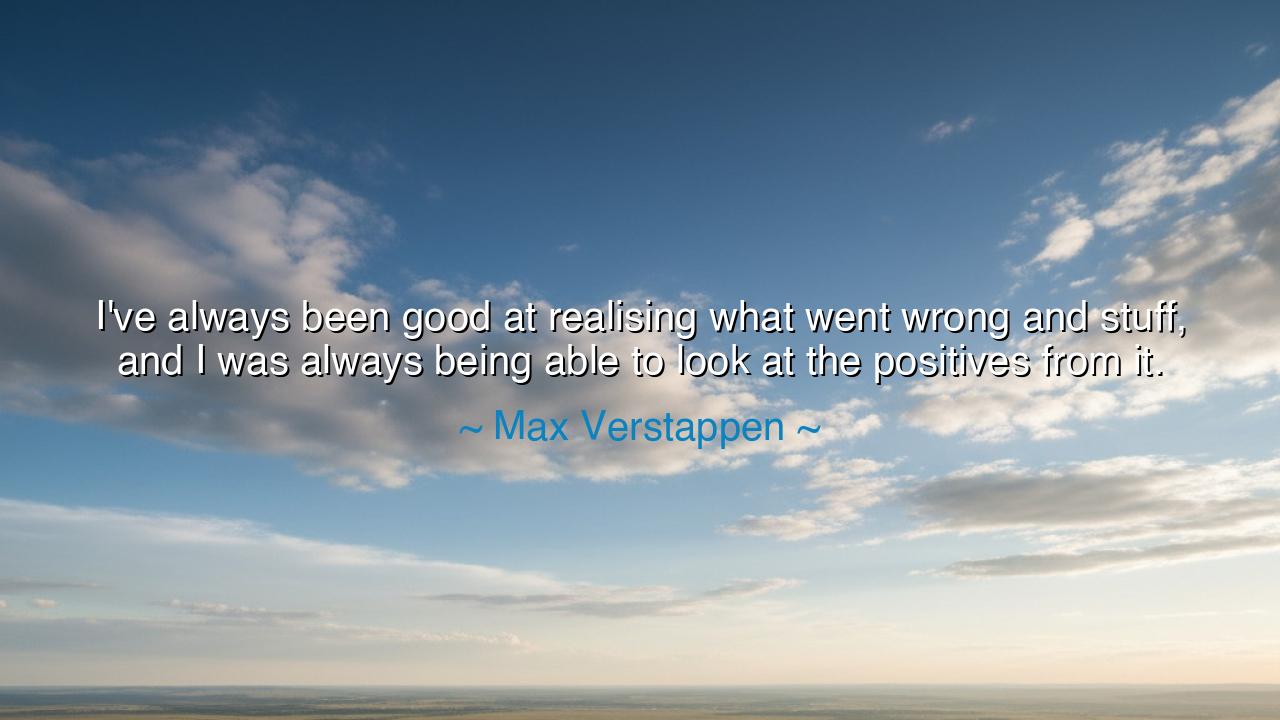
I've always been good at realising what went wrong and stuff
I've always been good at realising what went wrong and stuff, and I was always being able to look at the positives from it.






Hear the words of Max Verstappen, spoken with the calm of one who has faced triumph and defeat alike: “I've always been good at realising what went wrong and stuff, and I was always being able to look at the positives from it.” In this reflection, there is a truth older than the sands of time—that failure is not the end but the teacher, and that within every stumble lies the seed of growth. To see error with clear eyes, and then to draw strength rather than despair from it, is a discipline that shapes champions, leaders, and men of wisdom.
The first key lies in realising what went wrong. Many souls fall not because they stumble, but because they refuse to see the stone that tripped them. Pride blinds them, excuses shelter them, and so they walk in circles, repeating the same fall. But to examine one’s mistakes with honesty is the mark of maturity. The ancients taught that self-knowledge is the highest wisdom; so too in our age, to face failure squarely is the path to mastery.
The second key is the ability to look at the positives within misfortune. Here lies the alchemy of resilience: to transform the lead of disappointment into the gold of learning. This does not mean ignoring pain, nor pretending that loss is victory, but rather asking: What can this moment teach me? How can this setback make me stronger? Such questions turn defeat into preparation, and every failure into a stepping-stone toward greatness.
History shows us the power of this truth. Consider the story of Thomas Edison, who was asked about the thousands of failed attempts before he discovered the working filament for the lightbulb. He replied that he had not failed, but had found “ten thousand ways that did not work.” By realising what went wrong and refusing to despair, Edison turned relentless trial into triumph, bringing light to the world. His genius was not in perfection, but in his refusal to let failure rob him of hope.
So too in the realm of conquest and leadership. Alexander the Great, though remembered for victory, endured many missteps. Yet he studied each error—whether in siege, supply, or strategy—and adapted swiftly, turning weakness into strength. His empire was not built on flawless beginnings, but on the discipline of learning. He lived the truth Verstappen echoes: that the path of mastery is paved not with unbroken success, but with wisdom drawn from defeat.
The meaning of this quote is thus: greatness is not the absence of error, but the ability to transform error into advantage. Those who linger in regret become prisoners of the past; those who deny their failures are doomed to repeat them. But those who, like Verstappen, look steadily at their mistakes and then seek out the positives, rise each time stronger than before. This is the essence of resilience, the armor of champions, and the compass of progress.
The lesson for us is clear: do not fear failure, but fear blindness to its lessons. Practical wisdom calls us to three acts. First, when you fall, pause and examine, asking honestly what went wrong. Second, discipline your mind to seek the positives, no matter how small—a skill learned, a truth revealed, a strength awakened. Third, carry that wisdom forward, so that tomorrow’s steps are guided by today’s stumbles. In this way, your failures will not chain you, but propel you toward the heights you seek.
So let it be remembered: Max Verstappen’s words are not only the wisdom of a racer, but of life itself. To see clearly what has failed, and yet to find light in the ruins, is the art of those who endure and triumph. May we all learn this discipline, so that our errors do not diminish us, but instead shape us into vessels of strength, wisdom, and victory.






N720 Tran Hieu Ngan 7.1
This line from Verstappen says a lot about his mentality. It’s easy to dwell on what went wrong, especially when success is measured in milliseconds. But his ability to extract positives suggests a deep confidence in his process. I wonder if that comes from his natural temperament or if he’s trained himself to think this way. It’s a powerful lesson in not letting setbacks define you, but instead, refine you.
HVDuy Hung Vo
What I find interesting about this statement is how casually he talks about something that takes most people years to learn—resilience. Turning negative experiences into lessons is crucial, not just in sports but in life in general. I’d love to know if Max learned this mindset from experience or if it was something he developed through coaching and competition. Either way, it’s a reminder that growth requires perspective.
NMhue nguyen mai
This quote really reflects the mindset of a champion. Being able to identify what went wrong without getting discouraged is such a powerful skill. Still, I’m curious—does focusing on the positives ever risk overlooking important mistakes that need to be fixed? There’s a fine balance between optimism and accountability, and Verstappen seems to have mastered it. It makes me wonder how he keeps that mental balance during tough races.
TThanh
I like how Max Verstappen’s words show a sense of maturity and self-awareness. It’s not easy to admit mistakes and still find positives in them, especially in such a high-pressure environment like Formula 1. I wonder if this mindset is what separates good drivers from great ones—the ability to turn failure into fuel for improvement. Do you think his attitude toward setbacks is what’s made him so consistent under pressure?